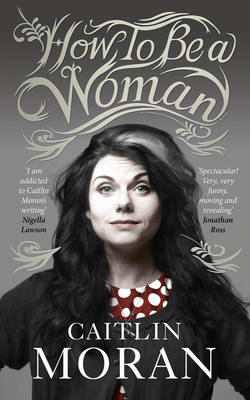Reviewed by Amber (The Literary Phoenix) on
While I’m not sure is Caitlin Moran ever called this a “feminist manifesto” herself, or if it was a published review or blurb… but let’s remember that a manifesto is (per the Merriam-Webster Dictionary) “a written statement declaring publicly the intentions, motives, or views of its issuer”… so basically, this is just her views. Why in the world someone would claim she speaks for the entire feminist movement in her memoir, I don’t know. This book gets a bad rap for that statement, but if you can step away from that for a hot minute, this is actually a really insightful and really funny memoir.
And end rant. I really felt the need to address that, because when I was excitedly praising How to Build a Girl (which is still hilariously wonderful), Twitter informed me that “We Don’t Like Caitlin Moran Because She’s Wrong About Feminism and We Do Not Read Her Books and Support Her Non-Intersectional Feminist Conversation”. Like I said, I don’t agree with her definition of feminism in that particular chapter – I personally find it pretty narrow – but the rest of the book? I really liked it.
This may be, in part, because Caitlin Moran is a great, funny narrator. Her humor style is self-disparaging and that is totally my brand. She addresses subjects that I, as a women, have never really spoken about with girlfriends, and I completely appreciated that. Because she’s right in many respects – culturally, there are certain unspoken expectations for women that some people are really good at, and that we judge each other for, and that are sometimes pretty ridiculous. Caitlin Moran calls out just about all of them, and sometimes, it’s just really nice to be angry about things that as expected of being a woman.
In fact, some things hit home super hard. For example, when it comes to fashion in the real world, I feel like she really nailed it on the head? In the chapter on clothing and fashion, she says: “Women are just supposed to be good at clothes, and look down at those who aren’t.” And man did that hit home. Listen, I’m terrible at fashion. And I work in finance in Boston. This is a truly horrifying place to be bad at fashion. I was in a Women’s Leadership class on unconscious bias a few weeks ago and one of the groups of women came up with “women just need to be better at dressing themselves” as a solution to beauty bias (judging people unfairly based on how they look). And you know what? Hearing someone prominent say that this is a thing that happens in the real would and my immediately horrified reaction was not unreasonable was… amazing? And a lot of her book is like this.
If there is something, anything feminine that irks you – Caitlin Moran has a rant for it. If your sense of humor lines up, this book will be a delightful adventure. If that’s not your cup of tea… I can see why many women are actually offended by How to Be a Woman. Caitlin Moran and I have very similar opinions on weddings (hate them, even my own) and high heels (can’t walk in stilettos, wondering why it’s so important I have this skill).
I appreciated her willingness to tell the story of the very difficult birth of her first child. For the most part, you still have to dig for stories about imperfect pregnancies. And a lot of women have very smooth experiences, but as someone who had a terrible experience, the openness of discussion on others’ experience – even those not quite like mine – really empowers me. There’s nothing like a miscarriage, infertility, or a difficult birth to make a woman feel insufficient. I very much appreciate her candid conversation. It’s always lovely to be reminded: I am not alone.
If you’re sensing that a lot of my happy touchpoints on How to Be a Woman are incredibly personal – you would be correct! Fact of the matter is, this is a book filled with essays on someone else’s life. Like any memoir, when you can relate, it feels deliciously like reading someone else’s diary and it elevates your own life experience. If nothing in the story is relatable, or if you disagree with the opinions presented… the book won’t do anything for you. It would probably make you angry, to be honest, because Caitlin Moran is proudly blunt. So tread carefully. This isn’t a book with inbetweens – you’ll love it, or you’ll hate it. Whether it’s for the content or Moran herself, I can’t say.
I really like her writing style, but it isn’t a book I’d recommend to everyone. It is a book I’d recommend to the right person. In fact, I already have. There are definitely some chapters where I felt her delivery took away from her message. Regardless, It’s a book that will join The Princess Diarist and The Girl With the Lower Back Tattoo on my shelf. I enjoyed certain parts of it so much because it made me feel heard and validated as a woman in a society that unapologetically has its own opinion about these things. And while, like I said, I don’t agree with her personal definition of feminism (I find it pretty limited), I do agree on her perspective on a lot of the other topics in this book and for those conversations… I really liked it.
Reading updates
- Started reading
- 7 August, 2019: Finished reading
- 7 August, 2019: Reviewed
